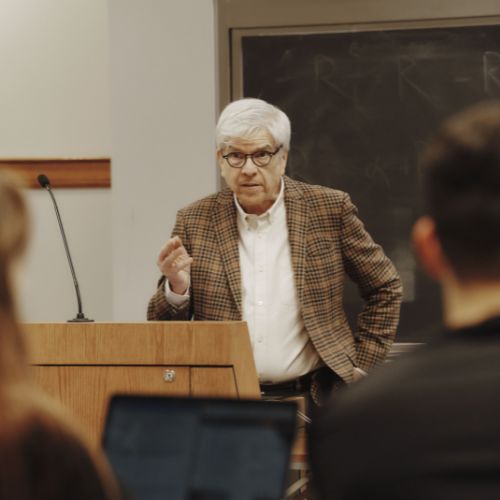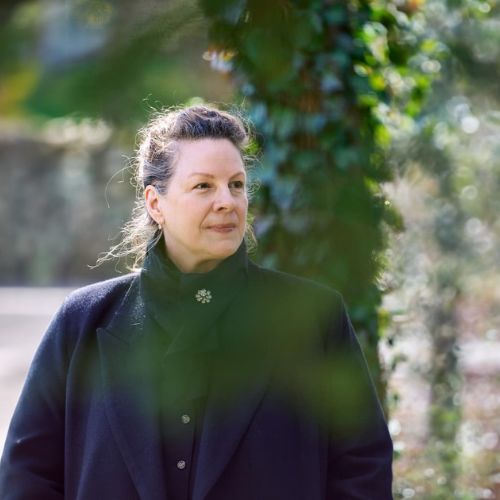When Alicia Munnell stepped down from President Clinton’s Council of Economic Advisors in 1997, she was at a career crossroads. At 55, she was too young to retire, but the Wall Street firms that often hire Ph.D. economists weren’t calling. When Boston College offered Munnell its Peter F. Drucker Chair in Management Sciences, she figured it would be a transitional role. Within months, however, she’d won a grant to set up what became Boston College’s Center for Retirement Research—and she stayed another 27 years. At the end of 2024, just after her 82nd birthday, Munnell officially retired. After years spent studying when people should stop working and how to fund what comes next, Munnell talked earlier this year with Carroll School News about navigating these choices herself (not always the best way). She also spoke of her unlikely ascent as an economist quoted almost every day in national media.
.jpg)
Did you always want to be an economist? Did you imagine that you'd so often wake up in the morning and see yourself in the newspapers?
In college I was more interested in parties than studying. I got married my junior year at Wellesley and graduated in the top two thirds of my class. When the placement person told me that my first job was a dead-end placement, my reaction was, "Great, just what I'm looking for!" For some reason, which I really don't understand, I decided to get a master’s in economics [and later a Ph.D. at Harvard] while I worked at my dead-end job, and, much to my amazement, I did well. Then, everything changed when I went to work at the Brookings Institution in 1966. Everybody cared about what was happening in the world—figuring out how to make a difference. In the 1970s, a wise person suggested that I might want to think about what I say, because people might actually be listening. Who knew!
Why did you work well past typical retirement age?
I love the Center. It was fun to run something, put out first-class work, have people come to us for advice, and have the press be very interested in what we were doing. It was just downright fun.
During your career, retirement savings shifted from pensions to the 401(k). Was that a good thing?
There were fears when companies moved to 401(k)’s, but the providers and Congress have improved that system. Today 401(k)’s work well for the top third of the population, so-so for the middle third, and not well at all for the bottom third. I try to avoid the debate over 401(k)’s versus pensions because it’s coverage that’s really the issue—it’s important to make sure every worker has a way to save through payroll deductions. 401(k)’s actually work better than pensions for people who change jobs frequently because they’re more portable.
Why do so many people believe Social Security is going to disappear?
The problem is so simple. We have a gap between costs and revenues. That gap is being filled by the trust fund that’s been built up since the 1980s. In 2033, the trust fund will be exhausted. But the money coming in is still enough to fund 80 percent of benefits. So the whole debate is around the remaining 20 percent. Social Security is going to be there for people, unquestionably—the issue is whether we are willing to pay higher taxes to keep the existing full benefits.
“ Social Security is going to be there for people, unquestionably—the issue is whether we are willing to pay higher taxes to keep the existing full benefits. ”
Is it frustrating that our society can’t resolve this?
The last significant Social Security legislation was in 1984. For 40 years we’ve done nothing because it’s hard to get people to focus on something that is going to happen in the future. It’s humbling to try to persuade the public or Congressional staff on these issues, but just having a voice out there saying “Social Security is going to be there for you” is a partial offset to the newspaper stories that say it’s going bankrupt.
Related
In nearly 50 years of teaching, research, and leadership, Carroll School Professor Judith Gordon has had an enduring impact.
With high student debt and extraordinary housing costs, how will young people save for retirement?
It’s a huge problem. I have grandchildren who are in their 20s. People that age face enormous challenges. One of the major ways people save is by paying down a mortgage, and I don’t know how people will do that if they can’t afford to buy a house.
Will retirement ages increase because of more people working remotely?
We’re studying that issue now. Personally, I hate working remotely. I miss the social interaction. We’re never going back to having no flexibility, but I’d like to see people mostly back in offices.
The Wall Street Journal wrote about your retirement planning mistakes. What do you regret?
From a tax standpoint, I wish I’d started putting money into Roth 401(k)’s at around age 60. It seems crazy that we didn’t. But this whole area is too hard. I recently wanted to rebalance my portfolio to move some money from stocks to bonds. I have a Ph.D. and this is my area of expertise, and my son works at Goldman Sachs. It took us an hour just to do that.
What advice would you give to people who are now planning their retirements or starting out in retirement?
For those currently working in lovely jobs, like mine, I would urge them to continue working at least to 70 both for financial reasons and for fun. Having structure and regular social interaction is a beautiful thing. For those with jobs they really don't like, I would urge them to delay claiming Social Security as long as possible. I don't have any advice for those starting out in retirement—I'm just eight weeks into feeling my way.





